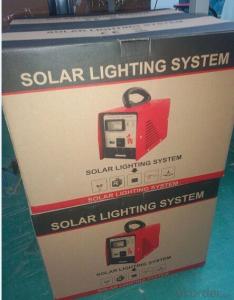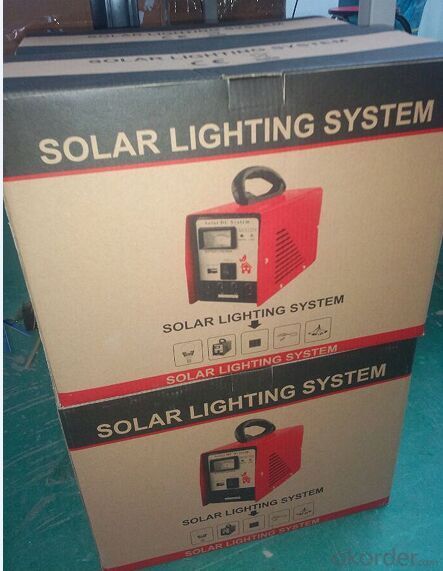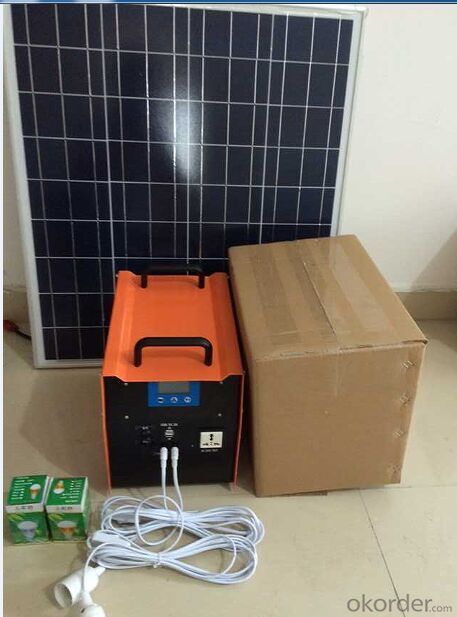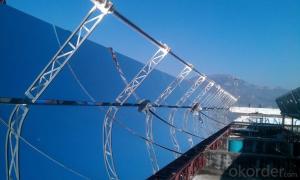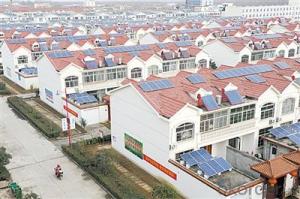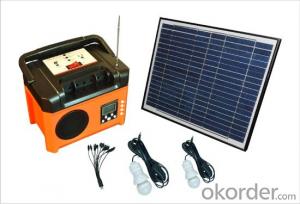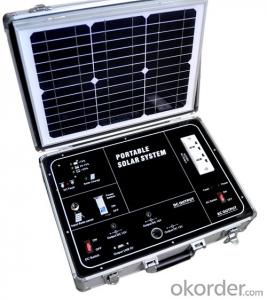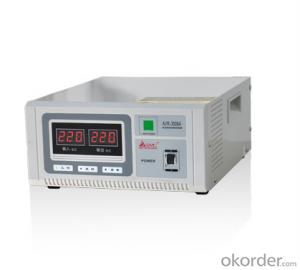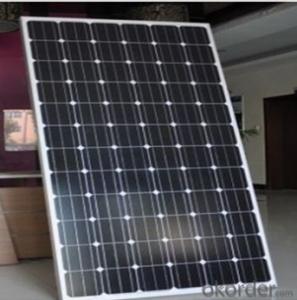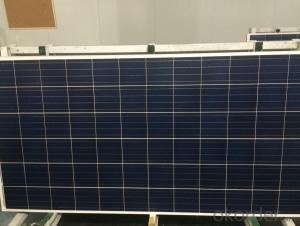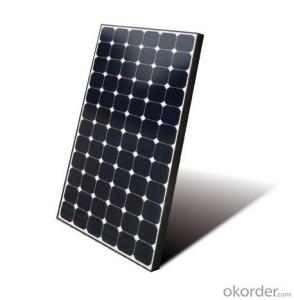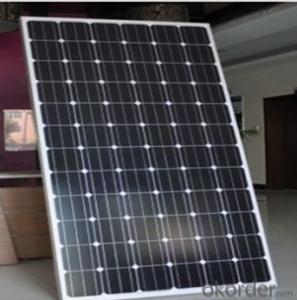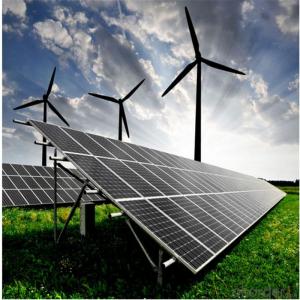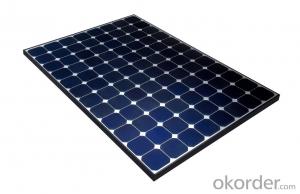500w Solar Energy Systems Home Solution Approved by TUV UL CE
- Loading Port:
- China main port
- Payment Terms:
- TT OR LC
- Min Order Qty:
- 1 pc
- Supply Capability:
- 100 pc/month
OKorder Service Pledge
OKorder Financial Service
You Might Also Like
Specification
500W Solar Home Solution Approved by TUV UL CE
Production description
PV array:
Convert sunlight instantly into DC electric power. Formed by the solar modules (also called photovoltaic
modules) in accordance with the system requirements for series and parallel.
Solar charge controller:
A charge controller may be used to power DC equipment with solar panels. The charge controller
provides a regulated DC output and stores excess energy in a battery as well as monitoring the battery
voltage to prevent over charge or over discharge. An inverter can be connected to the output of a charge
controller to drive AC loads.
Inverter:
Converts DC output power of photovaltaic soalr panels into standard AC power for use in the local off-grid
electrical network. It is a critical component in a photovoltaic system, allowing the use of ordinary
commercial appliances.
Battery banks:
Stores energy when there is an excess coming in and distribute it back out when there is a demand. Solar
PV panels continue to re-charge batteries each day to maintain battery charge.
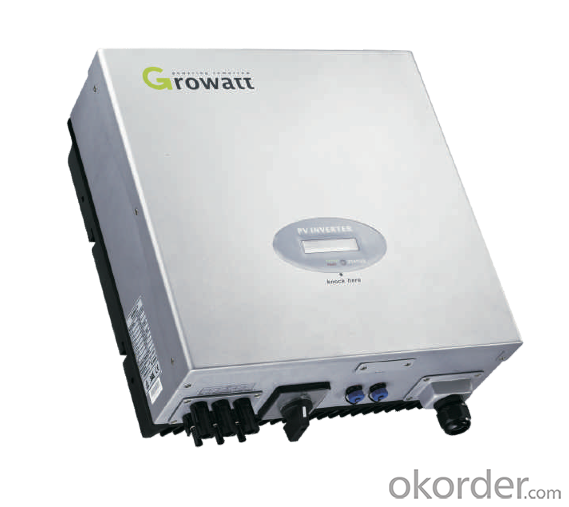
Feature
1.High conversion efficiencies resulting in superior power output performance.
2.Outstanding power output even in low light or high temperature conditions
3.Optimized design for ease of soldering and lamination
Physical characteristic
1. Rigorous quality control meets the highest international standards.
2. High-transmissivity low-iron tempered glass, strong aluminium frame.
3. Using UV-resistant silicon.
- Q: Can a solar energy system be installed in areas with high winds?
- Yes, a solar energy system can be installed in areas with high winds. However, it is important to ensure that the system is properly designed and installed to withstand the wind conditions of the specific area. This may involve using strong and durable mounting systems, reinforced frames, and secure anchoring methods to ensure the panels and components remain stable during high wind events.
- Q: Can solar energy systems be used in areas with high wind speeds?
- Yes, solar energy systems can be used in areas with high wind speeds. While wind may affect the efficiency of solar panels to some extent, modern solar technologies are designed to withstand various weather conditions, including high winds. Additionally, wind speeds can even help in cooling the solar panels, leading to improved performance. However, it is important to consider the specific wind conditions and design the solar energy system accordingly to ensure its optimal functioning.
- Q: Can solar energy systems be financed?
- Yes, solar energy systems can be financed. There are several options available for financing solar energy systems, including loans, leases, and power purchase agreements (PPAs). One common financing option is a solar loan, which allows homeowners and businesses to borrow money to install a solar energy system and then repay the loan over time. These loans can be obtained from banks, credit unions, or solar financing companies. Solar loans may have fixed or variable interest rates and repayment terms ranging from 5 to 25 years. Another financing option is a solar lease, where the solar energy system is owned by a third-party and the homeowner or business pays a monthly lease payment to use the system. In this arrangement, the third-party is responsible for maintenance, repairs, and system performance. Solar leases often come with little to no upfront costs and can provide immediate savings on electricity bills. Power purchase agreements (PPAs) are another popular financing option for solar energy systems. With a PPA, a third-party developer installs and maintains the solar panels on a customer's property, and the customer agrees to purchase the electricity generated by the system at a predetermined rate. PPAs can provide a fixed rate for a specific period, allowing customers to lock in lower electricity costs and reduce their reliance on fossil fuels. In addition to these financing options, there are also various incentives and rebates available that can help reduce the cost of installing a solar energy system. These include federal tax credits, state and local incentives, and utility-based incentives. Overall, the availability of financing options for solar energy systems has made it more accessible for homeowners, businesses, and organizations to transition to clean and renewable energy sources.
- Q: Can solar energy systems be used in powering construction sites or temporary structures?
- Solar energy systems are certainly capable of powering construction sites or temporary structures. In fact, the utilization of solar power in these situations is growing due to its many advantages. To begin with, construction sites often lack access to conventional power sources, making solar energy a practical solution. Solar panels can be easily installed on rooftops, scaffolding, or even on the ground, providing a dependable source of electricity throughout the construction process. Moreover, solar energy systems offer flexibility in power generation. They can be tailored to meet the specific energy demands of construction sites, whether it be for powering tools, lighting, or charging equipment. This adaptability ensures that construction activities can proceed seamlessly without any disruptions. Additionally, solar energy systems are environmentally friendly. By harnessing energy from the sun, construction sites can significantly reduce their carbon footprint and contribute to sustainable practices. Solar power does not generate harmful emissions or noise pollution, which is particularly advantageous in urban areas or sensitive environments. Furthermore, solar energy systems provide long-term cost savings. Although the initial investment for installing solar panels might be higher compared to traditional generators, the ongoing operational costs are substantially lower. Construction sites can benefit from reduced fuel expenses, maintenance costs, and a reduced reliance on fossil fuels. It is worth noting that solar energy systems can also be utilized for temporary structures such as mobile offices, portable restrooms, or event venues. These structures can be conveniently powered using solar panels, eliminating the need for generators or grid connections. In conclusion, solar energy systems are a practical and sustainable choice for powering construction sites and temporary structures. They offer reliable, customizable, and cost-effective power solutions while minimizing the impact on the environment. As the global shift towards renewable energy continues, solar power is likely to become even more prevalent in the construction industry.
- Q: Are there any safety concerns with solar energy systems?
- Yes, there are a few safety concerns with solar energy systems. The major concern is the risk of electrical shock or fire due to improper installation or maintenance. Additionally, there is a potential hazard associated with the use of toxic materials, such as certain chemicals used in the manufacturing of solar panels. However, these risks can be minimized through proper installation by qualified professionals and regular inspections and maintenance.
- Q: Can solar energy systems be used in areas with limited access to solar batteries?
- Yes, solar energy systems can still be used in areas with limited access to solar batteries. While solar batteries are a convenient way to store excess energy generated by solar panels for use during non-sunny periods, they are not the only option for utilizing solar energy. In areas with limited access to solar batteries, alternative methods such as grid-tied systems or direct use of solar power can be employed. Grid-tied systems allow excess energy to be fed back into the electrical grid, while direct use involves utilizing solar power immediately as it is generated. Therefore, solar energy systems can still be effectively used in areas without access to solar batteries.
- Q: Are there any advancements in solar energy system technology?
- Yes, there have been significant advancements in solar energy system technology in recent years. These advancements include improved solar panel efficiency, development of new materials and designs for panels, increased energy storage capacities, and integration of smart grid technologies. Additionally, there have been innovations in solar tracking systems, solar concentrators, and the use of perovskite solar cells, which have the potential to further enhance the efficiency and affordability of solar energy systems.
- Q: What is the environmental impact of using solar energy systems?
- The environmental impact of using solar energy systems is significantly lower compared to traditional energy sources. Solar energy systems produce electricity without emitting greenhouse gases or harmful pollutants, thus reducing air pollution and mitigating climate change. Additionally, solar panels require minimal water for operation and have a long lifespan, resulting in reduced water usage and waste. While the production and disposal of solar panels have some environmental implications, they are outweighed by the long-term benefits of clean, renewable energy generation.
- Q: Can solar energy systems be easily expanded or upgraded?
- Yes, solar energy systems can be easily expanded or upgraded. One of the major advantages of solar technology is its modular nature, allowing for scalability and flexibility. If you have additional space available, you can simply add more solar panels to increase the capacity of your system. Additionally, advancements in solar technology have made it easier to integrate new panels with existing systems. Upgrading a solar energy system can also be done by replacing older or less efficient components with newer and more efficient ones, such as upgrading to higher capacity inverters or adding battery storage for energy storage purposes. The expandability and upgradability of solar energy systems make them a cost-effective and sustainable choice for meeting increasing energy demands over time.
- Q: Can solar energy systems be used in historical or protected buildings?
- Yes, solar energy systems can be used in historical or protected buildings. However, careful consideration and planning are required to ensure that the installation of solar panels or other equipment does not compromise the architectural integrity of the building or violate any preservation guidelines. Innovative design solutions, such as integrating solar panels into existing structures or using discreet mounting systems, can often be employed to minimize the visual impact on historical buildings. Additionally, consultation with preservation experts and obtaining the necessary permits are crucial to ensure the compatibility of solar energy systems with the unique characteristics of these buildings.
Send your message to us
500w Solar Energy Systems Home Solution Approved by TUV UL CE
- Loading Port:
- China main port
- Payment Terms:
- TT OR LC
- Min Order Qty:
- 1 pc
- Supply Capability:
- 100 pc/month
OKorder Service Pledge
OKorder Financial Service
Similar products
Hot products
Hot Searches
Related keywords
